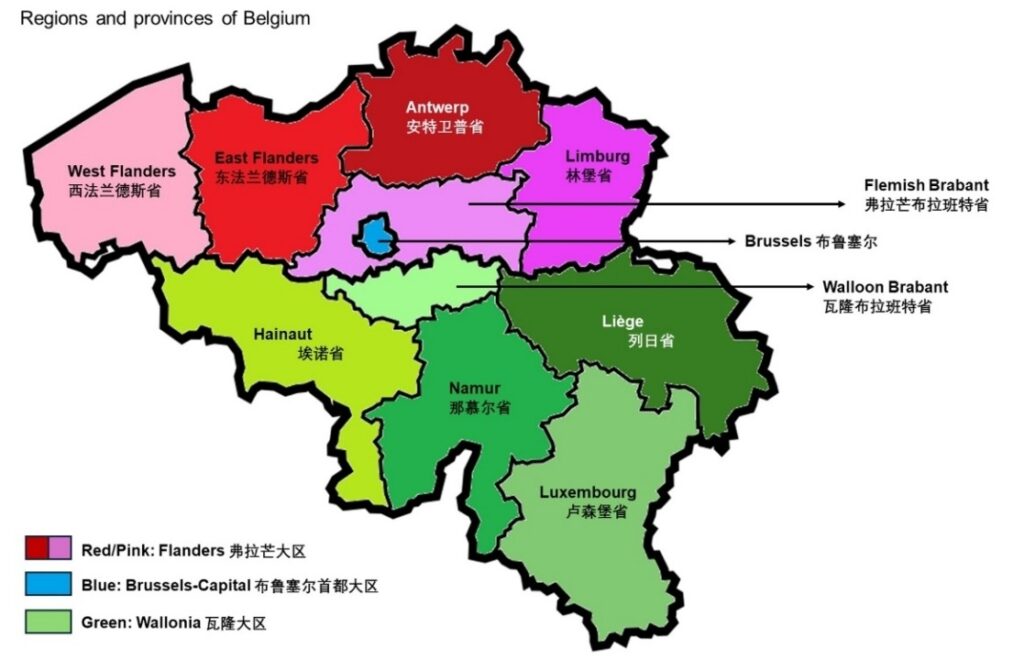Belgium may be a small country, but it plays a major role in global business. One of Belgium’s key strengths is its multilingual business environment, which makes it an attractive destination for Chinese companies. Understanding how to deal with Belgium’s unique language landscape can provide international companies with a competitive edge when entering the European market.
1. The multilingual landscape of Belgium
Belgium has three official languages: Dutch, French, and German. Dutch is the primary language in Flanders (North), French dominates Wallonia (South), and a small German-speaking community resides in the east. Brussels, the capital of Belgium and home to the European Union’s headquarters, is officially bilingual in French and Dutch. However, English is widely used as a lingua franca due to the city’s international character and the presence of a significant expatriate community, with non-Belgians making up almost 40% of the city’s residents.

2. Competitive advantage for Chinese companies
Belgium’s multilingual environment provides a distinct advantage for Chinese companies operating in diverse European countries. The ability of Belgians to communicate in multiple languages allows companies to seamlessly interact with a diverse customer base. This enhances customer service and marketing efforts, as businesses can better tailor their approaches to varied linguistic groups, ensuring effective engagement with European audiences.
In addition, Belgium’s linguistic diversity plays a crucial role in facilitating trade and negotiations with various markets, enabling Chinese companies to establish strong cross-border partnerships. International companies setting up in Belgium benefit from the ease of communication with neighboring countries, as the workforce is accustomed to operating in multiple languages. Furthermore, Belgium’s regional linguistic differences foster flexibility and cultural understanding among employees, making Belgian companies highly effective in international business settings. This cultural adaptability allows businesses to explore the European market with greater ease, building relationships across linguistic and cultural boundaries.
3. Challenges
Although Belgium’s linguistic diversity brings many advantages, businesses still face some challenges that need to be overcome.
Regional language preferences: Companies need to carefully select the appropriate language when communicating with clients and partners. Marketing campaigns in Flanders should be in Dutch, while French is necessary for Wallonia. Miscommunication or failure to adapt to these preferences can result in lost business opportunities or alienation of certain customer segments.
Legal and administrative complexities: Belgium’s federal structure results in varying regulations and business customs across regions. Different administrative requirements may create bureaucratic hurdles when working with regional authorities, as companies may need to put in extra effort to comply with different regulations.
Multilingual workforce management: Finding employees proficient in multiple languages can be challenging, especially for specialized roles. Businesses must ensure their teams have both linguistic and cultural competencies to operate within Belgium’s diverse business environment.
Internal communication barriers: Multinational companies operating in Belgium often face difficulties in maintaining smooth internal communication across regional offices. Establishing multilingual policies and utilizing translation tools or multilingual staff can help bridge this gap.

Belgium’s multilingual business environment is a valuable asset for Chinese companies looking to expand in Europe. However, effectively engaging in its linguistic and cultural diversity requires strategic adaptation. Businesses that understand regional differences and implement tailored communication strategies can strengthen their presence in the European market.
Please contact the Belgian-Chinese Chamber of Commerce (BCECC) in case you have any questions.

